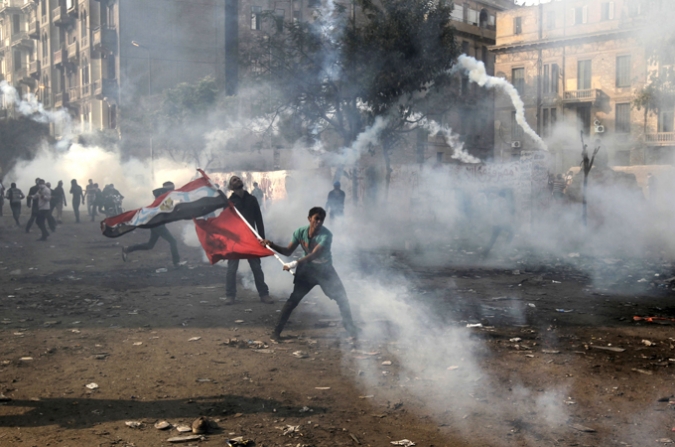
Protesters overwhelming rejected the SCAF’s offer to expedite the transition to civilian rule through a popular referendum. Demonstrations continued in several cities on November 23, with additional casualties reported in Alexandria, bringing the official death toll to 35. Meanwhile, a number of major political parties are reportedly considering calling on the SCAF to postpone the first stage of the parliamentary elections for two weeks.
PROTESTS:
1) Protesters overwhelming rejected the SCAF’s offer to expedite the transition to civilian rule through a popular referendum. Demonstrations continued in several cities on November 23, with additional casualties reported in Alexandria, bringing the official death toll to 35. After the Interior Ministry promised to withdraw security forces from the square, soldiers were deployed to the side streets around the square, prompting a group of al-Azhar imams to try to negotiate a truce between protesters and the armed forces. Hostilities ceased temporarily on the afternoon of November 23 after the two sides agreed to a truce. [VOA, English, 11/23/2011] [Al-Masry al-Youm, Arabic, 11/23/2011] [Al-Jazeera, English, 11/23/2011] [Al-Masry al-Youm, English, 11/23/2011]
SCAF/CABINET:
2) The SCAF published a statement to its official Facebook page on November 23 denying using any tear gas canisters against and stressing that the armed forces have been instructed not to use weapons of any kind against the Egyptian people. The SCAF also urged youth to ignore rumors. [Al-Masry al-Youm, Arabic, 11/23/2011]
3) In a televised speech on November 22, Field Marshal Mohamed Hussein Tantawi expressed “regret” over the clashes in Tahrir Square and announced several concessions:
- The SCAF is prepared to hold a referendum on immediately transferring power to civilian authority if people demand it.
- Tantawi pledged to hold presidential elections no later than June 2012 and said that the SCAF is committed to holding parliamentary elections as scheduled, with the first round to begin on November 28.
- Tantawi formally accepted the resignation of Prime Minister Essam Sharaf’s cabinet, which will continue performing its functions until the formation of a "national salvation government." [YouTube, Arabic, 11/22/2011]
4) Minutes before Tantawi’s speech, the Cabinet announced on its official Facebook page that the Interior Ministry will withdraw security forces from Tahrir Square. [The Daily News Egypt, English, 11/22/2011] [Facebook, Arabic, 11/22/2011]
5) The SCAF issued a statement, Communique No. 82, announcing that the investigation into violence at Maspero and Tahrir Square will be transferred from a military to a civilian prosecutor. [Al-Ahram, English, 11/23/2011]
6) Presidential hopeful Mohamed ElBaradei has outlined conditions for leadership of the new salvation government that the SCAF has agreed to form, amid reports that the SCAF Chief of Staff Sami Anan met leaders of political parties on November 22 to discuss the possibility of appointing ElBaradei to lead the new government. ElBaradei did not attend the meeting, and said he would only accept the appointment if parliamentary elections proceed as scheduled on November 28, and if his nomination is approved by the new parliament. He also insisted on the authority to make decisions without interference by the SCAF. [Al-Masry al-Youm, Arabic, 11/23/2011]
ELECTIONS:
7) A number of major political parties are considering calling on the SCAF to postpone the first stage of the parliamentary elections for two weeks, according to anonymous sources close to the discussions. The Wafd Party had floated a similar proposal in a public statement on November 22. Polling is due to begin on November 28 in 9 governorates, including Cairo and Alexandria, where the largest anti-military demonstrations are taking place. [Al-Ahram, English, 11/23/2011]
PARTIES/MOVEMENTS:
8) Responding to Tantawi’s speech on November 22, the April 6 Youth Movement vowed to continue its sit-in in Tahrir and other governorates until all four of its demands are achieved: 1) conducting a presidential election by the the end of April; 2) transferring power to a civilian presidential council; 3) forming a national salvation government with full powers independent from the SCAF; 4) and launching immediate investigations into the clashes in Tahrir. [Al-Masry al-Youm, English, 11/23/2011]
9) Several political parties reportedly delivered a collective apology to the protesters “for not providing them with a political cover for the past 72 hours,” according to Amr Hamzawy, an independent liberal parliamentary candidate. [UPI, English, 11/23/2011]
10) Presidential candidate Amr Moussa called on the SCAF to immediately cease violence against protesters. [Al-Shorouk, Arabic, 11/23/2011]
U.S. POLICY:
11) The White House stepped of criticism of the SCAF on November 22. “The violence needs to stop,’’ White House press secretary Jay Carney said. “The Egyptians need to be able to decide their future and decide it in a peaceful manner.’’ [AP, English, 11/22/2011]
12) State Department spokeswoman Victoria Nuland called for restraint on November 22, saying, “We condemn the excessive force used by the police.’’ “We strongly urge the Egyptian government to exercise maximum restraint, to discipline its forces and to protect the universal rights of all Egyptians to peacefully express themselves,” Nuland said. [AP, English, 11/22/2011]
Photo Credit: Al Jazeera
Image: eg_blog.jpg
